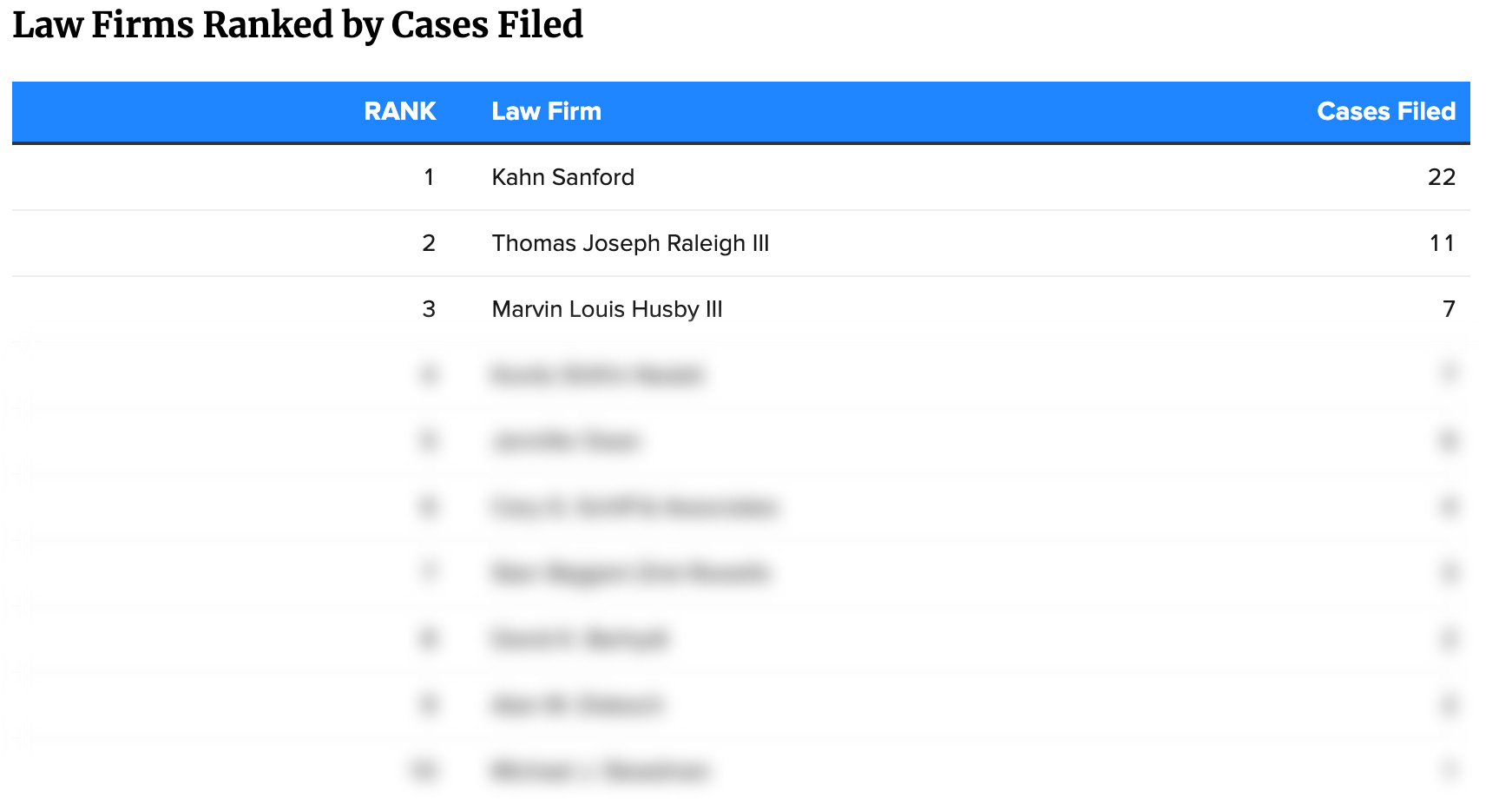Robert Kahn is convinced Chicago eviction courts have softened up too much in the post-pandemic era.
“No one likes siding with the landlord,” he said.
Yet he does it every day, in thousands of Cook County court cases every year, to claim the top spot as Chicago’s most frequently employed eviction law firm by a wide margin.
Among a dataset of more than 142,000 Cook County eviction lawsuits initiated since 2017 (not including thousands of cases filed during the pandemic and kept under seal due to emergency orders), Kahn’s law firm represented landlords in a commanding 15.6 percent of cases, according to data from the Cook County Circuit Clerk’s Office that was analyzed by The Real Deal.
Kahn is the second-generation head of Chicago-based law firm Sanford Kahn, named for his father, who is credited with co-authoring Illinois’ law on forcible entry and detainers — a.k.a. evictions — in the 1970s. Sanford Kahn was the first law firm to specialize in representing apartment landlords in Chicago’s evictions system. In the last seven years, the firm represented landlords in more than twice as many cases as second-ranked Thomas Raleigh III, which has climbed the ranks over the past few years, according to the industry’s top players.
“Rob became the king. He was literally reared for this. He used to be a kid running around on the 14th floor of the Daley Center where the eviction courts were,” said Melvin Sims III, a frequent opponent of landlords whose firm Tenants Rights Group is among the most frequently employed by defendants in Chicago evictions.
Subscribe to TRD Data to unlock this content

“My guess is we file more than anyone else in the state, and probably more than anyone else in the country.”
Sanford Kahn maintains its top spot with clients that include the multifamily giants Waterton and Related Midwest. It has filed more than 22,000 Cook County eviction suits since 2017, according to the court data.
“We used to have all the landlords. As the years go by, some of them break off, and these other attorneys come in. We’re the biggest shop in the area, so there is nowhere to go but down,” Kahn said. “My guess is we file more than anyone else in the state, and probably more than anyone else in the country.”
His Chicago caseload is just a portion of all his firm handles. Sanford Kahn covers a total of seven other jurisdictions collaring Cook County. It has gotten a lot easier to advance his suits in a timely manner the farther away they are from Chicago in recent years. That’s because tenant protections instituted during the pandemic have evolved into permanent changes in the eviction process and its negotiating tactics.
“It used to be you could get a tenant out of your unit in a couple months and pay $800 to get them out. Now it takes six to eight months and it costs about $2,000 in Cook County,” Kahn said, due to the rising costs of litigation and longer wait times for cases to be resolved. He cites the elongated process compared to the pre-pandemic timeline for keeping units off the market — and rent out of landlords’ pockets.
The higher costs of evictions have been factored into rent hikes, according to Kahn.
While he remains at the top of his field, Kahn has railed against new strategies to get evictions resolved, arguing that one in particular — judges more frequently sealing records of eviction cases against tenants to shield them from the public — is particularly troubling.
“I’m not here to screw every tenant, but I think if you don’t pay a landlord and they have to file an eviction against you, that should be a black mark on your record and the public has a right to know that,” Kahn said.
Landlords are more frequently offering to dismiss and seal cases brought against tenants who agree to a hasty move-out, such as exiting their residence in less than 30 days. Judges have more widely accepted such offers from landlords and agreed to seal cases much more frequently compared to the pre-pandemic norm, according to experts. There’s a questionable legal basis for the diminished transparency, compared to the pre-pandemic tradition that was more averse to sealing.
It’s a deal that landlords are willing to make in many cases in order to get an apartment generating revenue again more quickly, and tenants are in favor so they can rent another apartment without an eviction case getting flagged on a background check and turning off landlords.
The pandemic ushered in policies in favor of concealing eviction records after Governor J.B. Pritzker required cases to be redacted during the health crisis’ early days, a rule that lasted months.
“It’s easier for me to handle my cases when I can seal, because I don’t have to go to trial. But from a principle standpoint, you’re letting someone off Scot-free,” said Charles Zivin, an attorney with Wolf Solovy, who has ramped up his eviction caseload to hundreds a year since 2022.
Mark Swartz, who heads the Law Center for Better Housing, favors the greater openness to sealing. His organization helps administer the eviction court’s Early Resolution Program started in response to the pandemic — a step in the process that gets many cases dismissed without a judgment but that has added weeks, if not months, onto the timeline for landlords to get units refilled.
Swartz pointed out that over a decade, about 40 percent of eviction cases ended with a dismissal as opposed to a judgment, meaning tenants worked out their issues with their landlord in most of those situations to come to a settlement, avoiding a more serious money judgment that could lead to collections.
“A lot of people don’t even understand the difference between a filing or a judgment, and frankly they don’t care,” Swartz said. “I understand why a landlord wouldn’t rent to someone with a filing if they’re looking at someone else without one. But eviction court records are not really the most determinative way to decide whether or not you want a tenant. That’s why I advocate for sealing in most cases.”
For the most part, Kahn only approves of sealing a case when a tenant pays back a substantial portion of the back rent they’re alleged to owe their landlords, usually at least 50 percent, he said.
Even though Kahn laments the amount of time added to the eviction process by the startup of the Early Resolution Program — which helps tenants and their landlords check if they’re eligible for rental assistance from state or federal sources and gets many cases resolved — he isn’t afraid to let landlords know they let a situation get out of hand.
“When a landlord calls me and says, ‘I have to get this guy out yesterday because he owes me $25,000,’ I say to them, ‘Well, what were you doing for the last six months that they now owe you $25,000?’” Kahn explained.
These days, he gives landlords a date about six months out when they’ll get possession of their unit again, twice as long as in years past. “The other side’s job is to buy as much time as possible. I can respect that,” Kahn said. He acknowledged recent success for tenant-oriented firms through establishing the Early Resolution Program.
Few other eviction firms have the bandwidth to take cases as deep into the appellate process as Kahn’s. Sanford Kahn has taken cases it feels present challenges to fundamental property owner rights as far as the Illinois Supreme Court, with the firm having constructed much of the state’s academic framework around eviction.
A big one known as Midland v. Helgason, litigated by Kahn’s father for a 1994 Illinois Supreme Court decision, found a landlord can continue to receive the portion of a tenant’s rent covered by a Section 8 voucher, known today as Housing Choice Vouchers, and still pursue eviction proceedings. It has been making a difference for landlords with low-income tenants who fall behind on rent ever since.
Up-and-comers in eviction law practice like Zivin and Michael Steadman, who cracked the top 10 with more than 1,400 cases filed in recent years, are familiar with the legacy of Kahn’s firm and often cite the appellate case law it has established.
While tenant protections can still draw the ire of Illinois property owners, Steadman says the environment would be tougher without the Kahns: “As far as making marks on the appellate level, landlords in Illinois have a debt of gratitude to Sanford Kahn.”
Editor’s note: This story has been updated to delete a description of Robert Kahn’s father Sanford Kahn as “late.”
